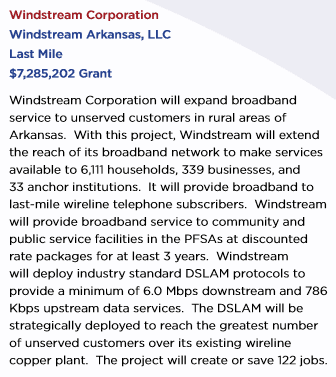
Time Warner Cable objects to publicly-owned broadband networks because they represent “unfair” publicly-funded “competition,” despite the fact TWC is also on the public dole.
The next time a cable operator or phone company claims community-owned broadband providers deliver unfair competition because they are government-funded, remind them that quite often that phone or cable company also happens to be on the public dole.
Take Time Warner Cable, which this week won a $5,266,979 grant courtesy of New York State taxpayers to extend their cable system to 4,114 homes in rural parts of upstate New York just outside of the cable company’s current service areas. That equals $1,280.26 in state tax dollars per household. For that public investment, Time Warner will reap private profits for shareholders from selling broadband, cable-TV, phone, and home security services to its newest customers indefinitely.
Now unlike some of my conservative friends, I am not opposed to the state spending money to wire rural New York. It is obvious cable and phone companies will simply never wire these areas on their own so long as Return on Investment conditions fail in these places. What does annoy me are the endless arguments we hear in opposition to public broadband from these same companies, claiming with a straight face that community-owned networks represent “unfair competition” because they are publicly funded. Time Warner Cable is no stranger to public taxpayer benefits itself, having won millions in tax abatements and credits in North Carolina, Ohio and a cool $5 million courtesy of Mr. and Mrs. N.Y. Taxpayer.
Many of the nation’s private telecommunications companies have plenty of love for federal, state, and local officials who have passed favorable tax laws and policies at their behest:
- AT&T not only did not pay any federal taxes in 2011, it actually secured a $420 million taxpayer-subsidized refund;
- Local governments have granted rights-of-way red tape cutting, tax credits and abatements in return for siting important facilities in select areas and hiring an appropriate number of employees to work in them;
- State laws that have made life easy for telecom companies, including statewide video franchising;
- State laws that make life difficult for their would-be competitors, especially public broadband networks.
So let us end the silly rhetoric about public vs. private broadband being a question of fairness. This is really a question about who controls your broadband future, your community or big telecom corporations.
In states like Georgia, elected politicians like Rep. Mark Hamilton want those decisions made by Comcast (Pennsylvania), Windstream (Arkansas) and AT&T (Texas). His bill would make it next to impossible for a local community to do anything but beg and plead the phone company to deliver something, anything that resembles broadband service. For a good part of rural Georgia (and elsewhere), the answer has always been a resounding “no,” at least until the federal government steps up and kicks in your money to help defray the costs of extending Windstream or AT&T’s sub par DSL service that slows to a crawl once the kids are out of school.

Windstream waited for the federal government to kick in $7.28 million in taxpayer dollars before it would agree to extend its DSL service to rural customers in its own home state of Arkansas.
You have to wonder about the Republicans in Georgia these days who used to fight for local and state control over almost everything. It should be instinctive for any conservative to want out-of-state pointyheads out of their business, but Rep. Mark Hamilton, himself a business owner, seems content forfeiting those rights to companies headquartered hundreds of miles away. If it was the federal government telling Georgia what kind of broadband service it deserves, do you think Mr. Hamilton would be so amenable? Unfortunately, should Hamilton have his way, for the foreseeable future, residents and business owners in Gray, Sparta, or Eatonton to count just a few will have broadband just the way the state’s phone companies want it — super slow DSL, dial-up or satellite fraudband.


 Subscribe
Subscribe